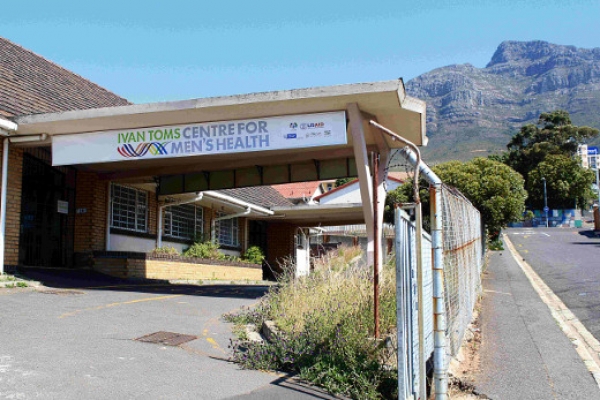

Photo by Masixole Feni.
24 October 2014
You enter the Ivan Toms Centre for Men’s Health via a quiet road on the side of Woodstock Hospital. Despite the modest surroundings that superficially look no different to any other clinic, this is a pioneering experiment in public health.
A gay man who is a patient at the clinic explains why he prefers using it to other clinics. He says he was sick for a “couple of months” and visited a public clinic where he tested positive for HIV. “This was not the problem,” he says. Instead what bothered him was that staff made comments about him being gay, while straight people “were treated totally different to how I was treated.”
About two years ago a friend recommended the Ivan Toms clinic to him. It changed his life and attitude. He received help and was treated fairly.
Dr Kevin Rebe, is an experienced HIV clinician in a programme called Health4Men. He has been one of the driving forces behind the Ivan Toms Centre. Rebe explains that men who have sex with men are at higher risk of HIV infection and transmission than heterosexual men.
He says that men who have sex with men face real and perceived barriers that prevent them from accessing appropriate health care. Being stigmatised and discriminated against by health workers is common and many men report negative experiences in state clinics. Rebe uses the term “skill deficit” to describe the problems many South African doctors and nurses have when it comes to providing appropriate service to men who have sex with men.
That, explains Rebe, is the main reason a clinic exclusively for men was established.
Rebe emphasises that men who have sex with men in South Africa are a diverse group of people with different sexual identities and behaviours. “Many also have sex with women,” he says.
It was in 2008 that Anova Health Institute, a non-profit organisation, in partnership with the Western Cape Department of Health launched the Health4Men project and the clinic. The programme is also supported by the US government. The clinic was named after the late Ivan Toms, an openly gay doctor and conscientious objector during the apartheid era, who was the Director of Health for the City of Cape Town at the time of his death in March 2008. Toms was just 54 at the time and had died suddenly and unexpectedly from meningitis.
Rebe explains that their services are aimed at men who practice sex with other men regardless of how these men identify themselves. Some of these men identify themselves as gay, others as bisexual and others still as straight. He said they also offer services to transgendered people.
The clinic’s primary aim is HIV prevention, diagnosis and treatment services but it deal with other related diseases too, including sexually transmitted infections, Hepatitis B and C, and the disease that causes the most deaths in people with HIV in South Africa: tuberculosis.
Rebe explains that men who have sex with men are at high risk of HIV irrespective of race. There is a particularly high risk of HIV transmission during unprotected anal sex.
The clinic has now provided services to more than 7,000 men in Cape Town. The racial breakdown is an approximate even split between white, black and coloured people ranging from as young as 17, with the oldest patient being 96.
Approximately 900 patients receive antiretrovirals to treat HIV from the clinic. While half of the clinic’s consultations deal with HIV, they also do much else, including mental health counselling and harm reduction for men who use drugs.
One challenge Rebe says the clinic has experienced is that for traditional reasons some black men would not want to be treated by women. However he says it is a problem that has only arisen occasionally and it is has been an easy problem to address.
“Our experience is that it’s all about the attitude of the health provider rather than their gender or race. Health providers who are sensitised to the health needs of men who sex with men, and who can provide services in an enabling environment are able to overcome traditional barriers,” says Rebe.